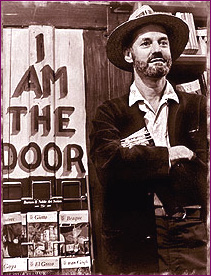 Lawrence Ferlinghetti Lawrence Ferlinghetti
Photo by Larry Keenan
Born March 24, 1919 in Yonkers, New York, Lawrence Ferlinghetti earned a doctoral degree in poetry at the Sorbonne in Paris with a dissertation entitled The City as Symbol in Modern Poetry: In Search of a Metropolitan Tradition. In fact he was about to become part of a metropolitan tradition himself, because after leaving Paris he moved to San Francisco, which was about to discover the Beat Generation.
Once in San Francisco, Ferlinghetti and Peter Martin started a literary magazine called City Lights, named after the Charlie Chaplin movie. He and Martin established their offices on the second floor of a building on Broadway and Columbus in North Beach. They decided to open a bookstore on the floor below as a side venture, naming it after the magazine. The City Lights Bookstore became one of the most famous bookstores in the world, and still stands proudly in its original location.
Doing double-time as a businessman and a poet, he began publishing original books by himself and others under the City Lights name, most notably the 'Pocket Poets Series.' The idea of Pocket Poets was to make poetry books easily affordable, and the small attractive paperback volumes are still a common sight today. Ferlinghetti published Allen Ginsberg's 'Howl' as Pocket Poets Number Four, and was tried on obscenity charges for this. He was declared innocent, a landmark victory for free speech.
Ferlinghetti's own poems are simple and speak plainly, and they remain popular with a wide range of readers. In 1958 he published a volume with one of my all-time favorite titles, 'A Coney Island of the Mind' (and in 1997 published a follow-up volume named after a beach town in south Queens, not far from Brooklyn's Coney Island, 'A Far Rockaway of the Heart.')
In the early 60's Ferlinghetti owned a rustic cabin in Bixby Canyon, Big Sur that became the focal point of Jack Kerouac's 1962 novel 'Big Sur.' Ferlinghetti appears in the book as the sensible Lorenzo Monsanto, who urges the drunken celebrity author based on Kerouac to go on a nature retreat to stop drinking, with terrible results.
Ferlinghetti was one of the more politically-minded of the Beats, and has been continually active on behalf of liberal causes. He attributes his pacifist consciousness partly to his wartime experiences: he had been sent to Nagasaki, Japan six weeks after the city was destroyed by the world's second atomic bomb.
Ferlinghetti is still active today as a poet and as the proprietor of City Lights. Two of his poems can be read here and here. I hope I won't seem politically incorrect for saying this, but after immersing myself in the writings of the guilt-obsessed asexual Jack Kerouac, the ridiculously horny Allen Ginsberg and the just plain sordid William S. Burroughs ... it's nice to read a few poems by a guy who can get excited about a little penny candy store under the El or a pretty woman letting a stocking drop to the floor.
Recognized as one of the most influential and important poets of the Beat movement, Lawrence Ferlinghetti was born in Yonkers, New York on March 24, 1919. Shortly after his birth, Ferlinghetti's mother was committed to an asylum for the insane and the young boy was sent to France to be raised by a female relative.
It wasn't until his return to America, at the age of five, that the future poet learned to speak English. Ferlinghetti also began writing poetry during his years at boarding school in the late 1920's.
During his adolescence, Lawrence not only became an Eagle Scout, an extremely prestigious feat in itself, but joined a street gang known as the "Parkway Road Pirates". It was his association with the latter group that led to an arrest for petty theft. Soon after, a woman by the name of Sally Bisland handed the troubled young man a copy of Baudelair poems which inspired his love for literature.
After his graduation from high school, Ferlinghetti attended the University of North Carolina at Chapel Hill, where he enjoyed works by Hemingway, Faulkner, Dos Passos and Wolfe. He even began writing a novel inspired by Look Homeword, Angel.
Many of his early years were spent living the life of the "Beat". On one occassion, Ferlinghetti and a couple of friends hitchhiked and hopped freight trains to Mexico while reading many of the popular poets of the period.
Ferlinghetti then joined the Navy where he became a Lieutenant Commander. Six weeks after the dropping of the atomic bomb, Ferlinghetti was discharged and spent some time in Portland. The G.I. Bill, along with his interest in writers, had him furthering his studies at the Sorbonne in Paris.
In 1952, Ferlinghetti became acquainted with Kenneth Rexroth. Rexroth had already established himself as a notable West Coast writer, artist and political activist. After meeting Peter Martin, the publisher of City Lights magazine, the two planned to open a bookshop by the same name.
The City Lights bookstore of San Francisco soon became a mecca for writers and artists, many of them well established in the field of contemporary literaure. The movement was catapulted by readings from writers such as Michael McClure, Allen Ginsberg and Gary Snyder and became known as the "Beat" period.
Perhaps one of the most volatile and creative times in post-modern literature, the Beat sub-culture today is looked back upon as a very glorious period. Ferlinghetti remains one of the most notable writers from those times and his writings are still widely read and appreciated today.
Excerpted from The Birth of the Beat Generation
Copyright 2002-2008 by Steven Watson/Waiting-forthe-Sun.net |
 Lawrence Ferlinghetti
Lawrence Ferlinghetti